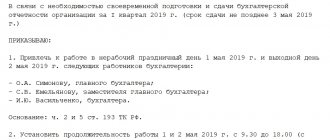Weekends and holidays in the Labor Code
Weekends and holidays are established for working citizens by two articles of the Labor Code of the Russian Federation: 111 and 112. Weekends refer to the time of weekly continuous rest. With a “five-day week” workers have 2 days off every week, with a “six-day week” - 1 day off (Article 111 of the Labor Code of the Russian Federation). At the same time, management must take into account that the duration of continuous rest less than 42 hours is illegal (Article 110 of the Labor Code of the Russian Federation), this is the legal minimum. With a “five-day workday” it is exceeded, since employees have 2 days off.
The legislator calls Sunday a general day off, and the second day off during the “five-day week” is regulated by the collective agreement and internal labor regulations. According to the general principle, 2 days off are given to an employee in a row, but if the peculiarities of the work process in the company do not allow this, they are given on different days of the week, according to groups of employees.
Important! If the employer has a six-day week, the minimum weekly rest period (42 hours) must still be observed. Rest time is regulated by PVTR. Otherwise, the company may be held liable in accordance with Art. 5.27.1 Code of Administrative Offences, part 1, part 5. The labor inspectorate reminds of this on its official website.
Thus, the specific work schedule and the provision of days off may have significant differences: a five-day week, a six-day week, “floating” and fixed days off, 12 and 24 hour shifts, however, the general requirements of the Labor Code of the Russian Federation must be observed, and days off must be provided weekly. If working time is taken into account in total, the amount of weekly rest must be observed on average for the accounting period: during a certain week it may be less according to the schedule, but for the entire period (for example, a quarter) the norm must be observed.
According to the Labor Code of the Russian Federation, the situation with holidays is simpler from the point of view of accounting and calculating payment for them. The list of such days contains Art. 112 of the Labor Code of the Russian Federation: days of the New Year holidays - January 1-8 (including Christmas on January 7), February 23 and March 8 - traditional "men's" and "women's" days, May 1 - Spring and Labor holiday, May 9 — Victory Day in the Second World War, June 12 — Russia Day, November 4 — National Unity Day. If the day coincides with a weekend, the Government moves it to the next working day.
Timesheet recording of working hours and weekends (holidays) is mandatory and practically important. The document, in addition to direct accounting functions, serves as evidence of compliance with legal standards and work schedules established in the organization, including on weekends.
Weekends on business trips
Victoria Khaidarova
In addition, in practice there are cases when employees have to carry out their work activities on weekends, which, for example, fall during a business trip.
Such work is paid at an increased rate, in accordance with the general rules of remuneration on weekends and holidays. In such a situation, the employer must issue an order to send an employee on a business trip that affects weekends in the form of a separate order. The order should also reflect the wording of the purpose of the business trip, indicating the dates.
Is it possible to force me to work on my days off?
The Labor Code of the Russian Federation establishes a ban on work on weekends and holidays as a priority (Article 113 of the Labor Code of the Russian Federation). It also indicates cases when an employee can be involved in work on “non-working” days and outside his work schedule. At the same time, the legislator cites cases when:
- the employee's consent is required;
- can be done without the employee's consent.
The first group of reasons is associated with urgent unplanned work, without which the company may stop its activities. The second group of reasons are accidents, catastrophes, industrial accidents, and other similar emergencies.
The employee must give written consent, not verbally; in addition, the trade union must have its say where it operates. Without the approval of this body, calling for work on days off is prohibited. A written order from management is also required.
It is prohibited to engage in work on weekends and holidays:
- pregnant women (Article 259 of the Labor Code of the Russian Federation);
- minors (Article 268 of the Labor Code of the Russian Federation).
Creative workers and media workers can regulate their days off and work on these days by collective agreement, LNA, or separate employment contract. This rule also applies to workers under 18 years of age.
When offering to work on a holiday or day off to mothers with young (under 3 years old) children or people with disabilities, the administration must take into account their health status. If there is a prohibition in the medical report, you cannot be recruited to work. In addition, it is necessary to familiarize them with the right to refuse work on “non-working” days upon signature.
What documents need to be drawn up to work on a day off?
Tatiana Amelina
To document a work shift on a day off, you will almost always need to obtain written consent from the employee , and from certain categories of employees, written confirmation that they are familiar with the right to refuse to go to work outside of the work schedule. Sometimes, according to the law (Parts 2, 3, 5, 7 of Article 113 of the Labor Code), you will also need to obtain permission from the trade union.
After this, the manager must issue an order to involve the employee in work on days off and familiarize the employee with it (Part 8 of Article 113 of the Labor Code). A sample order is given below:
| “ Order to hire an employee to work on a day off ” The download will begin immediately after clicking on the Word icon |
Double payment: how to calculate correctly
In accordance with Art. 153 of the Labor Code of the Russian Federation, for work on a day off, the employer pays no less than double the amount. Applicable:
- piece workers get double rates;
- The daily and hourly rate is double the rate.
For salaried employees, the monthly working hours are taken into account. Part of the salary is paid per day or hour of work:
- a single amount in excess of the salary within the monthly norm;
- double the amount above the salary if the monthly norm is exceeded.
When recording labor time in aggregate (for example, quarterly), payment is still calculated on a monthly basis. It is determined whether weekend work remains within the framework of the monthly working time standard. It compares how long the employee actually worked and what the norm is according to the production calendar. If there is no excess, the work on the weekend was within the normal time limits, otherwise it was above the norm. The applicable rate for payment as stated above will apply. At the end of the period, hours and days already paid are excluded from overtime periods.
Bonuses, if any, are also included in the payment calculation. This was indicated by the Constitutional Court of the Russian Federation (Resolution No. 26-P of 06/28/18). The same procedure for payment also applies to holidays and non-working days, if the periods were actually working periods.
The legislator especially emphasizes: if there are holidays in a month, it is impossible to reduce the salary on this basis. You need to pay the full amount.
An employee can refuse double pay for working on a day off (holiday) and take a day off at another time. In this case, the payment will be single, the day off will not be paid.
On a note! The company can set higher, compared to double, rates of payment for work on weekends and holidays. They are prescribed in the collective agreement, employment contract, LNA.
Step-by-step algorithm for registering an employee’s work on a day off
Olga Verbitskaya
So, step-by-step instructions for getting involved in work on a day off:
- The occurrence of unforeseen work , which may affect the normal functioning of the organization or individual entrepreneur, must be recorded by some kind of official document, for example: an internal memo from the head of a structural unit, a memo from an employee, etc., which determines the circle of employees who need to be involved in the work on weekends or non-working holidays.
- Based on the above document, written consent is obtained to be hired to work on a day off or a non-working holiday, and if work is carried out on a day off or a non-working holiday, it is necessary to involve women with children under 3 years of age, or disabled people from For these employees, it is necessary to obtain a document confirming the absence of medical contraindications, obtain consent to work on a day off or a non-working holiday, as well as a document confirming that this category of employees is familiar with the right to refuse to work on a day off or a non-working holiday.
- If there is a trade union organization, the employer sends information and receives a reasoned opinion on inviting employees to work on a weekend or non-working holiday.
- Work on a weekend or non-working holiday must be paid double or, at the request of the employee, he may be given a day of rest. In this case, work on a weekend and (or) a non-working holiday must be paid in a single amount, and a day of rest is not subject to payment (Article 153 of the Labor Code of the Russian Federation). In this regard, I recommend that the employer, before issuing an order, decide on compensation for work on a weekend or non-working holiday
- An order is issued to attract workers on a day off or a non-working holiday, which the worker gets acquainted with under signature. This order must reflect: whether to pay double on a given day or, at the request of the employee, he will be given a day of rest.
Nuances
In conclusion, I would like to highlight some important points within the framework of the topic under consideration:
- With a shift work schedule, if the shift falls on a weekend, it is paid without increasing factors, once (Article 111 of the Labor Code of the Russian Federation). A scheduled holiday is included in the worker’s normal time and is paid double. In this case, you cannot take time off (according to the recommendations of Rostrud dated 02/06/14). If, according to the schedule, such a day is a day off for him, payment will be the same as for a day off (Article 153 of the Labor Code of the Russian Federation, parts 1, 4).
- The company's management has the right to establish additional rest periods by order, but they must be paid. Reducing labor payments due to such additional periods is unacceptable (according to information from the Labor Inspectorate dated 02/19/20).
- A posted citizen is paid for weekends and holidays in exactly the same way as an ordinary citizen, doubled, if such dates and the purpose of the work were specifically indicated in the order when sent on a business trip; in other words, if it is known for certain that it worked. Examples include negotiations with partners and presentations. Days of arrival and departure that fall on a weekend or holiday are also paid with an increase; they are included in the business trip period.
- Weekends are included in vacation and paid as regular days. Holidays not working during the vacation period are excluded from it. These rest days are counted separately.
What compensation is an employee entitled to for going to work on a day off?
Tatiana Amelina
For being called to work on a non-working day, the employee is offered the choice of at least double compensation or time off and single compensation. If the employment contract was concluded for 2 months or less, then the employee does not have the right to take time off (Parts 1, 4 of Article 153, Part 2 of Article 290 of the Labor Code).
This is the minimum amount of payment, it can be higher, according to the terms of the employment contract with the employee, a collective agreement or a separate regulatory act approved by the trade union in accordance with Part 4 of Art. 135, art. 149, part 1, 2 art. 153 TK.
In practice, the amount and type of compensation for work, in addition to the work schedule, is indicated either in the order for hiring or in the order for payment for work beyond the schedule.
Which is more profitable: double pay or time off?
The economic benefits for employees working on their day off and for the enterprise administration vary greatly.
For employee
If we consider compensation options from the employee’s point of view, then in most cases, receiving additional payment above the established monthly salary is more preferable.
This conclusion does not apply to situations where an employee, for personal reasons, would benefit from additional days of rest.
If several days off are accumulated, the employee will have the opportunity to use these days to solve his own problems, and those days off when he was called to work due to production needs will be paid as usual.
For the employer
For the employer, the situation looks different. To save the administration's wage fund, it is more profitable to postpone the day off to another time, since time off is not subject to payment.
If an employee used time off in the same month when he worked on an odd day, then the total amount of earnings for the month will not change. In a situation where time off will be granted in the next month, the salary must be reduced by the “cost” of additional days off.
Special insurance experience - what is it?
Are you planning to fire a retiree? Find out whether it is possible to dismiss a person of retirement age at the initiative of the employer by reading our article.
A sample voluntary resignation letter can be found here.
Who should not be attracted
There are categories of people who cannot be involved in work activities outside of working hours:
- pregnant women;
- employees under 18 years of age.
In addition, there are restrictions on calling certain categories of citizens into service:
- disabled people;
- women with one or more children under three years of .
They cannot be involved without their written consent and if there are medical restrictions for health reasons .
The “RV Order” must contain information about the employee (full name and position), the exact dates when he was hired, the date the order was issued and the signatures of the employee and the manager (head of the HR department).
In addition to the above cases, there are times when workers are recruited without their consent . These cases will be discussed in more detail.










